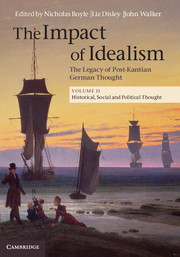Book contents
- Frontmatter
- Contents
- List of Contributors
- Acknowledgements
- List of Abbreviations
- Introduction: Idealism in historical, social and political thought
- 1 From transcendental idealism to political realism
- 2 The public of the intellectuals – from Kant to Lyotard
- 3 Idealism and the idea of a constitution
- 4 German Idealism and Marx
- 5 Ethos, nature and education in Johann Erich von Berger and Friedrich Adolf Trendelenburg
- 6 The concept and philosophy of culture in Neo-Kantianism
- 7 After materialism – reflections of Idealism in Lebensphilosophie: Dilthey, Bergson and Simmel
- 8 ‘Rationalisation’, ‘reification’, ‘instrumental reason’
- 9 Freedom within nature: Adorno on the idea of reason's autonomy
- 10 German neo-Hegelianism and a plea for another Hegel
- 11 Idealism and the fascist corporative state
- 12 Love and recognition in Fichte and the alternative position of de Beauvoir
- 13 Hegel's concept of recognition and its reception in the humanist feminism of Simone de Beauvoir
- 14 Giving an account of oneself amongst others: Hegel, Judith Butler and social ontology
- 15 Idealism in the German tradition of meta-history
- Bibliography
- Index
- References
9 - Freedom within nature: Adorno on the idea of reason's autonomy
Published online by Cambridge University Press: 05 December 2013
- Frontmatter
- Contents
- List of Contributors
- Acknowledgements
- List of Abbreviations
- Introduction: Idealism in historical, social and political thought
- 1 From transcendental idealism to political realism
- 2 The public of the intellectuals – from Kant to Lyotard
- 3 Idealism and the idea of a constitution
- 4 German Idealism and Marx
- 5 Ethos, nature and education in Johann Erich von Berger and Friedrich Adolf Trendelenburg
- 6 The concept and philosophy of culture in Neo-Kantianism
- 7 After materialism – reflections of Idealism in Lebensphilosophie: Dilthey, Bergson and Simmel
- 8 ‘Rationalisation’, ‘reification’, ‘instrumental reason’
- 9 Freedom within nature: Adorno on the idea of reason's autonomy
- 10 German neo-Hegelianism and a plea for another Hegel
- 11 Idealism and the fascist corporative state
- 12 Love and recognition in Fichte and the alternative position of de Beauvoir
- 13 Hegel's concept of recognition and its reception in the humanist feminism of Simone de Beauvoir
- 14 Giving an account of oneself amongst others: Hegel, Judith Butler and social ontology
- 15 Idealism in the German tradition of meta-history
- Bibliography
- Index
- References
Summary
A commitment to the thesis of the autonomy of reason can be located across various phases of German Idealism. Initiated in Kant's critical work, it developed diverse conceptualisations and functions in the philosophy of Fichte's Jena period, early Schelling and, arguably, all of Hegel's mature writings. For Kant the self-governance of reason was to mean, at the practical level, that rational agents could determine themselves through reason alone. To do so they would endorse principles for action, these principles taking the form of a law compelling for all rational beings. As materially pure, universal laws, practical principles were valid independently of the normative authority of existing sociocultural practice and of the pathological and wholly subjective preferences of any given empirical agent. The rational agent, through the use of autonomous reason, could both identify what a rational will should will and be at the same time moved to act upon what it wills. Kant's theory of reason offered a framework within which practical reason itself could be defended, and theories that privileged sentiment, happiness or any other variety of affective motive were exposed as antithetical to moral legislation.
For Kant it was not only practical reason that was capable of autonomy, that is, of providing us with laws that are independent of empirical causality. The very practice of philosophy itself – of theoretical reason – was to be reconceived as an exercise of autonomous reason. Without reference to experience it was supposed to be possible for reason to identify its own capacities and limitations. It could establish the different kinds of governance reason brings to bear on the various regions of concern to it. The limit points of reason were revealed when reason recognised its own contradictoriness within particular domains. Philosophy, construed in this new form, might be considered as reason's own self-explication.
- Type
- Chapter
- Information
- The Impact of IdealismThe Legacy of Post-Kantian German Thought, pp. 208 - 231Publisher: Cambridge University PressPrint publication year: 2013
References
- 2
- Cited by

